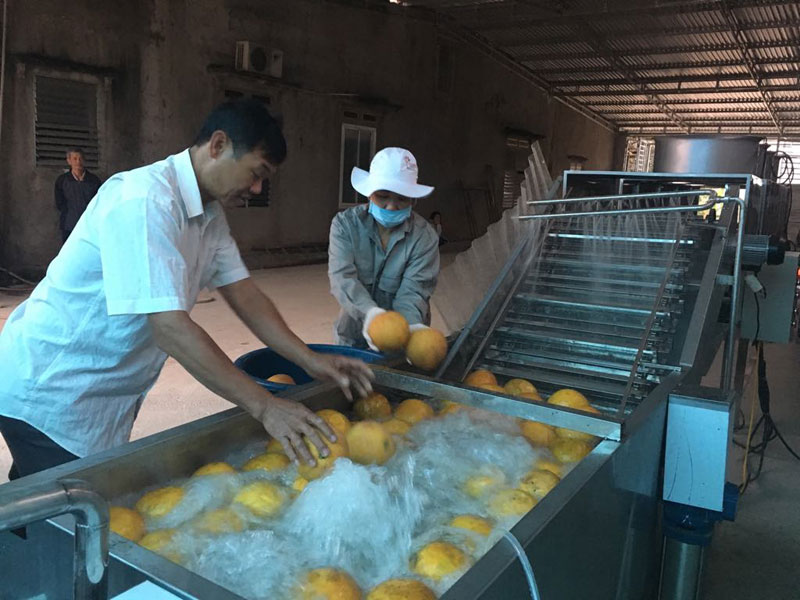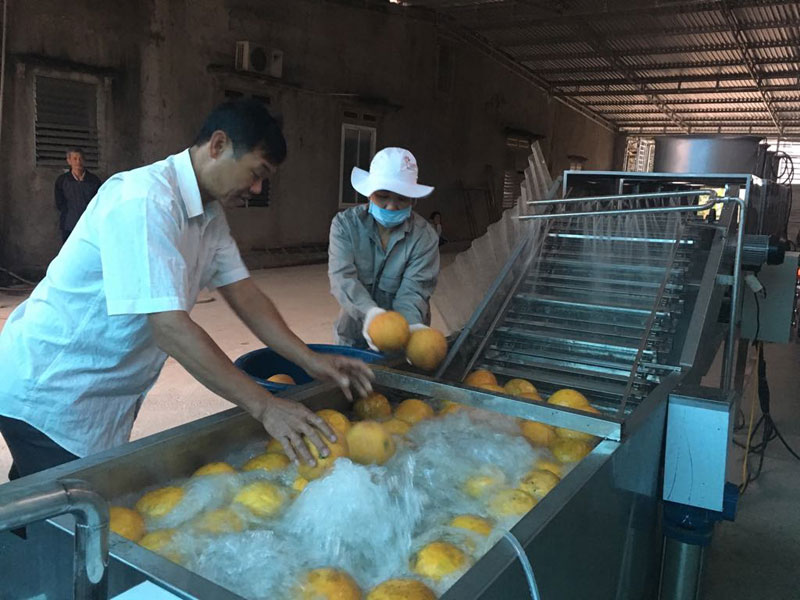
(HBO) – After the chayote of Tan Lac district obtained a collective mark in September 2016, local red pomelo was honoured with the recognition in December 2017. This year, the district has worked to help Nam Son tangerine earn the title.
After the Tan Lac red pomelo received the collective mark,
communications and education campaigns have been enhanced to raise public
awareness of pomelo cultivation.

In
2017, the Tan Lac red pomelo production and trading cooperative received support
in machinery and labelling to build the brand of the fruit.
Though the Tan Lac chayote got a collective mark several years
ago, the vegetable remains unknown in many markets, resulting in unstable
prices. At several times, the Tan Lac chayote even sheltered behind that planted
in Tam Dao district of Vinh Phuc province.
However, with the district’s efforts and cooperation with
authorised agencies of the province, the Tan Lac chayote has gradually gained a
foothold in the market. The establishment of the Quyet Thang cooperative in
Quyet Chien commune, which gathers farmers to grow chayote in a safe process, has
served as a proof.
Local farmers were provided with scientific and technical methods
to cultivate and take care of chayote under VietGAP standards and joined the
farm produce chain.
In addition, the chayote is packaged with origin-tracing stamps
on. The province and district also provide support to promote the product and
seek new markets.
As a result, the Tan Lac chayote planted in an intensive farming
zone in Quyet Chien commune and some neighbouring localities of Lung Van and
Nam Son has found markets, with more stable prices.
Especially, the product is well-liked by consumers of other
provinces, as it has been sold in some supermarkets and food shop chains in
Hanoi.
Chayote and pomelo are among 35 products of the district prioritised
to get support in the registration of geographical indication, recognition mark
and collective mark./.
According to data from the Hoa Binh Provincial Party Committee, the industrial production index for the first six months of 2025 is estimated to have increased by 20% compared to the same period last year. This marks the highest year-on-year growth rate for this period since 2020.
In the first six months of 2025, Hoa Binh province’s export turnover was estimated at 1.145 billion USD, marking an 18.11% increase compared to the same period in 2024. Import turnover was estimated at $ 804 million, a 17.15% increase, which helped the province maintain a positive trade balance.
The lives of the ethnic minority farmers in Tan Lac district have gradually improved thanks to the new directions in agricultural production. This is a testament to the collective strength fostered through the professional associations and groups implemented by various levels of the district’s Farmers’ Union.
With the motto the "product quality comes first,” after nearly one year of establishment and operation, Muong village’s Clean Food Agricultural and Commercial Cooperative, located in Cau Hamlet, Hung Son Commune (Kim Boi district), has launched reputable, high-quality agricultural products to the market that are well-received by consumers. The products such as Muong village’s pork sausage, salt-cured chicken, and salt-cured pork hocks have gradually carved out a place in the market and they are on the path to obtaining the OCOP certification.
In the past, the phrase "bumper harvest, rock-bottom prices" was a familiar refrain for Vietnamese farmers engaged in fragmented, small-scale agriculture. But today, a new spirit is emerging across rural areas of Hoa Binh province - one of collaboration, organisation, and collective economic models that provide a stable foundation for production.
Maintaining growing area codes and packing facility codes in accordance with regulations is a mandatory requirement for agricultural products to be eligible for export. Recently, the Department of Agriculture and Environment of Hoa Binh province has intensified technical supervision of designated farming areas and packing facilities to safeguard the "green passport" that enables its products to access international markets.



